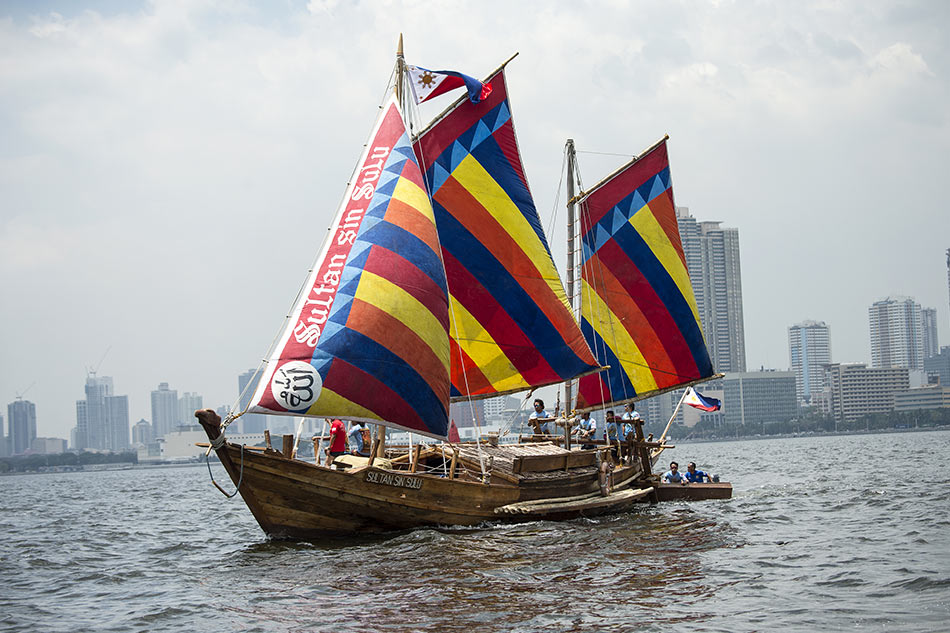Wooden Philippine boats to retrace historic China voyage | ABS-CBN
ADVERTISEMENT

Welcome, Kapamilya! We use cookies to improve your browsing experience. Continuing to use this site means you agree to our use of cookies. Tell me more!
Wooden Philippine boats to retrace historic China voyage
Wooden Philippine boats to retrace historic China voyage
Agence France-Presse
Published Apr 28, 2018 10:18 PM PHT
Crafted from a centuries-old design, three identical wooden boats set off from the Philippine capital for China on Saturday to retrace a historic trip by a Filipino sultan and showcase longstanding maritime ties.
Crafted from a centuries-old design, three identical wooden boats set off from the Philippine capital for China on Saturday to retrace a historic trip by a Filipino sultan and showcase longstanding maritime ties.
The 29 crew members on the three vessels—two propelled by engines and the third by sail—hope to make it across the South China Sea, a near-1,000-kilometer voyage, to the eastern city of Xiamen by May 2.
The 29 crew members on the three vessels—two propelled by engines and the third by sail—hope to make it across the South China Sea, a near-1,000-kilometer voyage, to the eastern city of Xiamen by May 2.
The 18-meter boats are replicas of a "balangay", a type of vessel used in the region as far back as 320 AD.
The 18-meter boats are replicas of a "balangay", a type of vessel used in the region as far back as 320 AD.
Sultan Paduka Batara—who ruled part of what is the Philippines today—sailed to China on a balangay in 1417 to pay tribute and to trade, Valdez said, but fell ill and died there.
Sultan Paduka Batara—who ruled part of what is the Philippines today—sailed to China on a balangay in 1417 to pay tribute and to trade, Valdez said, but fell ill and died there.
ADVERTISEMENT
Spain later colonized the Philippine islands in the 16th century.
Spain later colonized the Philippine islands in the 16th century.
Expedition leader Arturo Valdez hopes it is a case of fourth-time lucky: winds and rough seas forced his team back on three previous attempts using similar vessels.
Expedition leader Arturo Valdez hopes it is a case of fourth-time lucky: winds and rough seas forced his team back on three previous attempts using similar vessels.
"This boat is a replica of an ancient boat. It is not an all-weather boat. You have to fix it up. It is very vulnerable to weather and sea," he told reporters.
"This boat is a replica of an ancient boat. It is not an all-weather boat. You have to fix it up. It is very vulnerable to weather and sea," he told reporters.
Rough seas are forecast late next week. The state weather bureau in Manila expects a period of good weather from Saturday to the morning of May 2 but after that, conditions could get rough, he added.
Rough seas are forecast late next week. The state weather bureau in Manila expects a period of good weather from Saturday to the morning of May 2 but after that, conditions could get rough, he added.
The crew, which includes three women, are hoping they can slip through before the bad weather hits their route, Valdez said.
The crew, which includes three women, are hoping they can slip through before the bad weather hits their route, Valdez said.
Engines were installed on two of the boats to comply with Chinese maritime regulations that prohibit wind-powered vessels from docking alone, Valdez said.
Engines were installed on two of the boats to comply with Chinese maritime regulations that prohibit wind-powered vessels from docking alone, Valdez said.
Valdez, who previously led a Filipino expedition that climbed Mount Everest, said he is aware of the implications of the trip at a time when the Philippines and China still have a territorial conflict over parts of the South China Sea.
Valdez, who previously led a Filipino expedition that climbed Mount Everest, said he is aware of the implications of the trip at a time when the Philippines and China still have a territorial conflict over parts of the South China Sea.
But he said his voyage will demonstrate how the people of Southeast Asia crossed the high seas in the past to maintain contact.
But he said his voyage will demonstrate how the people of Southeast Asia crossed the high seas in the past to maintain contact.
"These waters never divided us. These waters unified us," he said. "And this boat, as a replica of an ancient boat, is a symbol of that relationship."
"These waters never divided us. These waters unified us," he said. "And this boat, as a replica of an ancient boat, is a symbol of that relationship."
ADVERTISEMENT
ADVERTISEMENT



